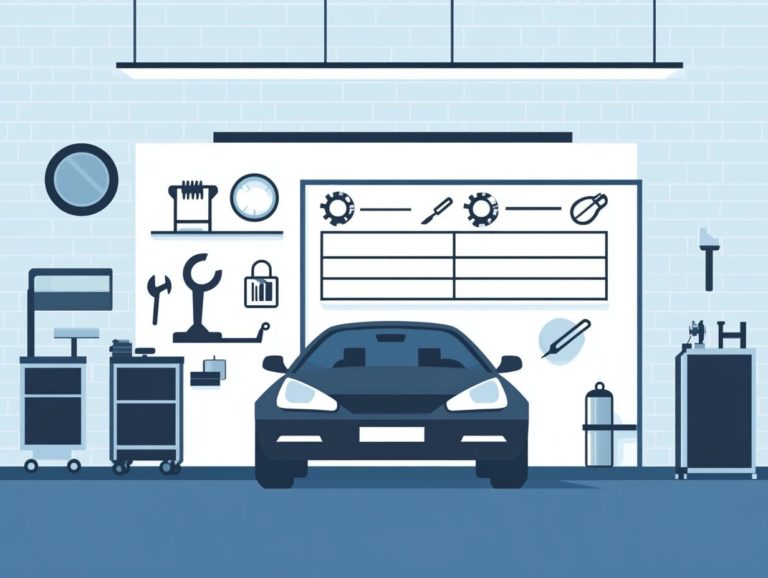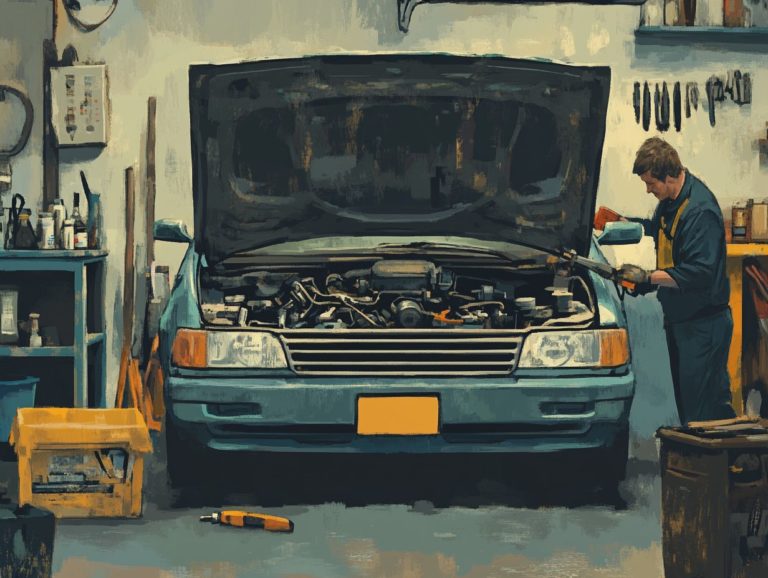How to Maintain Your Car’s Fuel System
A well-maintained fuel system is essential for your car s performance and longevity. Yet, it often slips through the cracks in regular maintenance routines. That s why keeping your fuel system in top shape is so important! By recognizing the warning signs of potential issues, you can address them before they escalate.
Explore vital maintenance techniques, ranging from changing fuel filters to advanced methods like cleaning fuel injectors. By grasping and addressing these elements, you ll enhance your vehicle s efficiency and sidestep expensive repairs that can sneak up on you.
Take charge now and protect your car’s fuel system for the best performance!
Contents
- Key Takeaways:
- The Importance of Maintaining Your Car’s Fuel System
- Signs of a Failing Fuel System
- Basic Maintenance Tips
- Advanced Maintenance Techniques
- Preventing Fuel System Problems
- Frequently Asked Questions
- Why is it important to maintain your car’s fuel system?
- How often should I get my fuel system checked?
- What are some signs that my fuel system needs maintenance?
- Can I maintain my car’s fuel system myself?
- What does a fuel system maintenance service typically include?
- How can I prevent issues with my fuel system?
Key Takeaways:
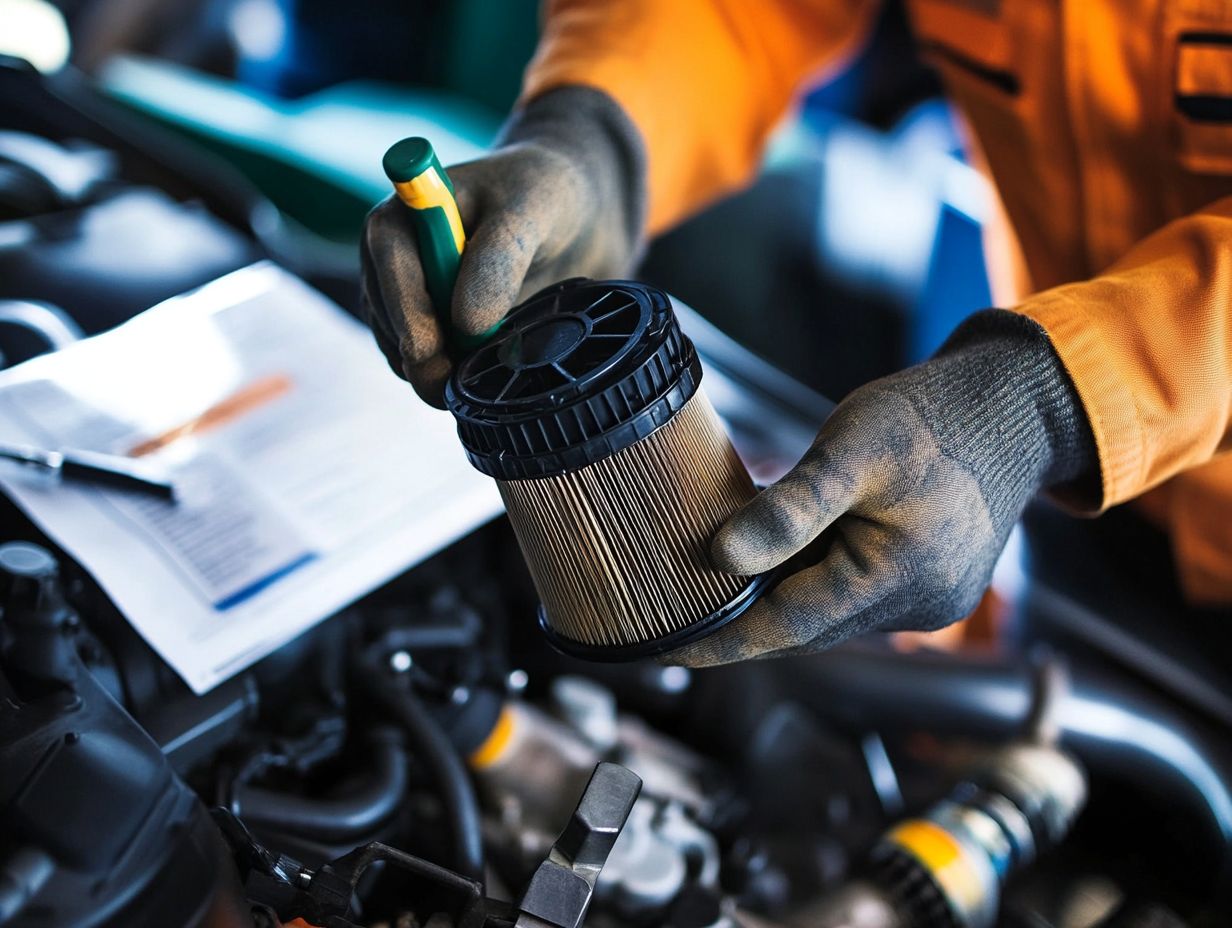
- Regular maintenance is crucial for a car’s fuel system to ensure optimal performance and prevent costly repairs.
- Be on the lookout for signs of a failing fuel system, such as poor fuel efficiency and engine misfires, and address them promptly.
- Basic maintenance tasks, like regularly changing fuel filters and using fuel additives, can help keep your fuel system in good condition.
The Importance of Maintaining Your Car’s Fuel System
Maintaining your car’s fuel system is essential for achieving optimal engine performance and longevity. Regularly tending to components like the fuel filter, fuel injectors, and fuel pump boosts fuel efficiency and helps you avoid costly repairs that come with clogged fuel systems and sensor malfunctions. Additionally, understanding how to maintain your car’s cooling system is also crucial for overall vehicle health.
A well-functioning fuel system ensures that fuel pressure remains adequate, facilitating smooth air intake and efficient combustion processes. Incorporating cleaning treatments can effectively tackle issues like the buildup of residue in the fuel system that can hinder performance and other contaminants that could compromise your vehicle’s overall performance.
Why Regular Maintenance is Necessary
Regular maintenance of your vehicle’s fuel system is essential to prevent any negative impacts on engine performance and fuel efficiency, just as it’s important to know how to maintain your car’s air conditioning system.
Neglecting routine tasks like changing fuel filters and cleaning fuel injectors can lead to serious complications down the line. Experts warn that a clogged fuel filter can cut fuel flow by as much as 50%, resulting in rough engine starts and diminished power. Maintaining fuel injectors can enhance fuel efficiency by up to 15%. By regularly tending to these components, you ensure that fuel reaches the engine in its best condition, significantly reducing the likelihood of costly repairs and promoting overall vehicle longevity.
By taking a few proactive steps, you can save yourself time, money, and a fair amount of frustration in the long run.
Signs of a Failing Fuel System
Recognizing the signs of a failing fuel system is crucial. By doing so, you can prevent costly repairs and ensure your vehicle operates seamlessly.
Identifying Common Issues
Identifying common issues within your fuel system can be a game-changer, saving you both time and money on repairs while ensuring your vehicle performs reliably.
Understanding how components like clogged fuel injectors or a failing fuel pump influence engine performance is essential. Clogged injectors can disrupt fuel delivery, leading to poor acceleration and decreased fuel efficiency. If the fuel pump is malfunctioning, it may struggle to provide adequate fuel pressure, resulting in rough engine starts and an inconsistent idle.
By paying attention to your vehicle’s performance like unusual sounds or vibrations you can catch these issues before they escalate. When you notice these symptoms, seeking professional assistance is a wise move. This proactive approach helps maintain optimal function and keeps costly breakdowns at bay.
Basic Maintenance Tips
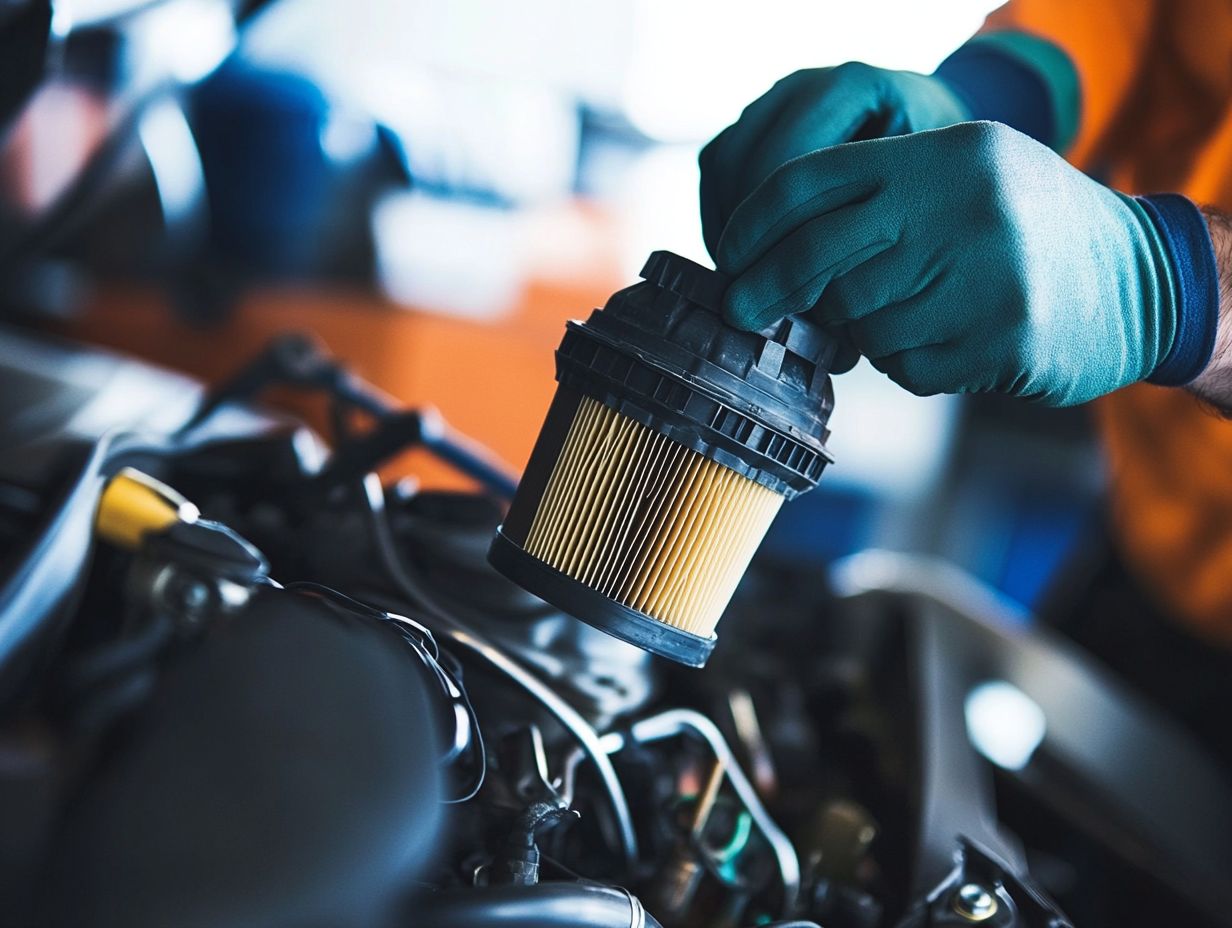
Implementing fundamental maintenance tips for your fuel system can greatly extend the lifespan and efficiency of your vehicle. For detailed guidance, check out how to maintain your car’s fuel efficiency. These steps not only ensure optimal performance but also protect your investment in the long run.
Changing Fuel Filters
Changing fuel filters regularly is essential for vehicle maintenance. It directly affects your engine’s performance and longevity. By replacing this component at recommended intervals, you can significantly boost your engine’s efficiency and reliability.
It’s advisable to change fuel filters every 20,000 to 30,000 miles. This interval can vary depending on your car’s make and model. The process is straightforward and involves a few key steps:
- Relieve the pressure in the fuel system.
- Carefully remove the fuel filter.
- Install the new fuel filter, ensuring all connections are secured properly.
Keeping your fuel filters clean prevents contaminants from disrupting the fuel injection system. This enhances fuel economy and overall engine responsiveness. Paying attention to this detail is crucial for anyone looking to enjoy a smooth and efficient driving experience.
Checking Fuel Lines and Connections
Regularly checking your fuel lines and connections is vital for maintaining the integrity of your vehicle’s fuel system. This practice helps you spot potential leaks or damage, significantly enhancing your vehicle’s performance efficiency.
A tiny crack in a fuel line or a loose connection can waste fuel and diminish engine performance. This impacts everything from acceleration to fuel economy. To conduct a thorough inspection, examine the fuel lines for signs of wear, like cracks or discoloration. Ensure all connections are tightened securely, using the right tools to prevent any accidental looseness over time.
Consistent maintenance in this area is crucial for avoiding costly repairs and maximizing your vehicle’s lifespan.
Using Fuel Additives
Using fuel additives can enhance performance efficiency and maintain your vehicle’s fuel system.
These specially formulated products offer numerous benefits. They remove carbon deposits, improve combustion, and prevent fuel line freeze. There s a wide range of additives designed to meet your specific needs everything from detergents that clean injectors to stabilizers that prolong the life of stored fuel.
For example, fuel system cleaners dissolve grime and residue, while octane boosters elevate fuel quality for those seeking extra power. Incorporating these treatments optimizes your engine s performance and contributes significantly to the overall longevity of your fuel system.
Advanced Maintenance Techniques
Employing advanced maintenance techniques, such as cleaning fuel injectors and replacing the fuel pump, is essential for optimizing your vehicle’s fuel system. This ensures peak engine performance.
This proactive approach enhances efficiency and prolongs your engine’s life, allowing you to enjoy a smoother, more powerful driving experience.
Cleaning Fuel Injectors
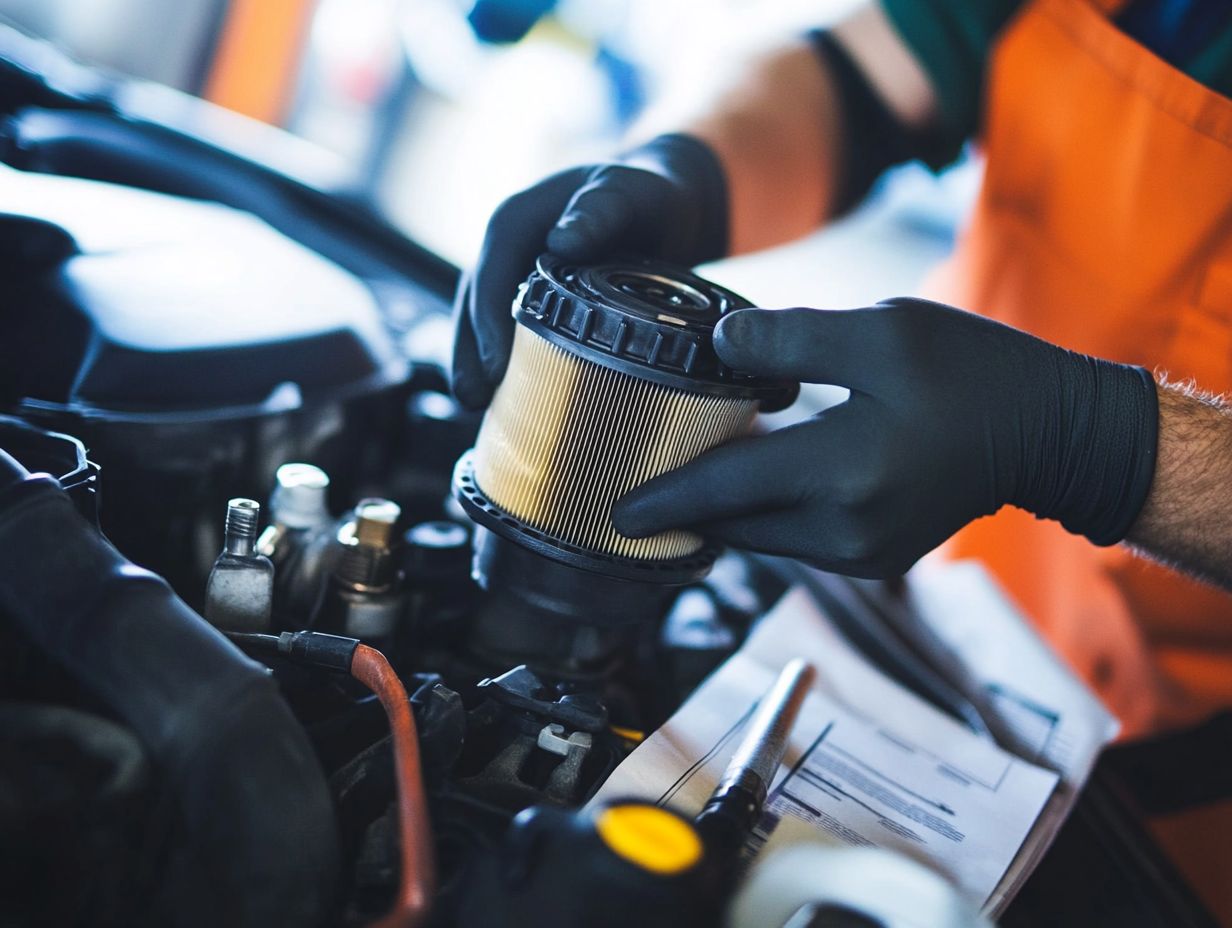
Cleaning your fuel injectors is a vital part of vehicle maintenance. It greatly enhances your engine’s performance.
This process supercharges your fuel system for peak efficiency, leading to improved acceleration and better fuel economy. Regular cleaning prevents the accumulation of deposits that can cause poor combustion. This can result in rough idling or stalling.
Most mechanics recommend inspecting and cleaning fuel injectors every 30,000 to 60,000 miles, depending on your driving habits and the quality of fuel you use.
By keeping those injectors clean, you ll enjoy smoother rides and better throttle response. This ultimately translates to savings at the pump and a more pleasurable driving experience.
Replacing Fuel Pump
Replacing a faulty fuel pump is crucial for maintaining the integrity of your vehicle’s fuel system. It ensures optimal engine performance. A well-functioning fuel pump plays a pivotal role in delivering the precise amount of fuel to the engine. This is essential for achieving smooth operation.
You may notice signs that indicate your fuel pump needs replacement. These include:
- Difficulty starting your vehicle
- Stalling during operation
- A noticeable decrease in fuel efficiency
If the pump isn t providing adequate pressure, significant engine issues could arise. To tackle this, start by checking the fuel pump relay and fuses. Then, inspect the fuel filter for any clogs before considering a replacement of the pump itself.
Timely maintenance and replacement of a malfunctioning fuel pump are vital. This helps avoid more extensive repairs, ensuring your vehicle runs at peak efficiency.
Preventing Fuel System Problems
Preventing fuel system problems is significantly more efficient and cost-effective than addressing repairs once issues emerge. Taking preventive actions saves time and money while keeping your car running smoothly.
Tips for Keeping Your Fuel System in Good Condition
Keeping your fuel system in great condition requires a series of proactive maintenance steps. Additionally, knowing how to maintain your car’s transmission can significantly boost performance and extend longevity.
Incorporating regular inspections into your routine is essential. They allow you to spot potential issues before they snowball into bigger problems.
Changing fuel filters on time is crucial. It prevents contaminants from clogging your system, which can lead to lower fuel efficiency.
Opting for quality fuel treatments can offer additional protection. These treatments clean the components that spray fuel into the engine for combustion, ensuring your engine operates seamlessly.
By weaving these straightforward yet effective practices into your maintenance schedule, you can protect yourself against costly repairs. Enjoy a more dependable driving experience.
Frequently Asked Questions
Why is it important to maintain your car’s fuel system?
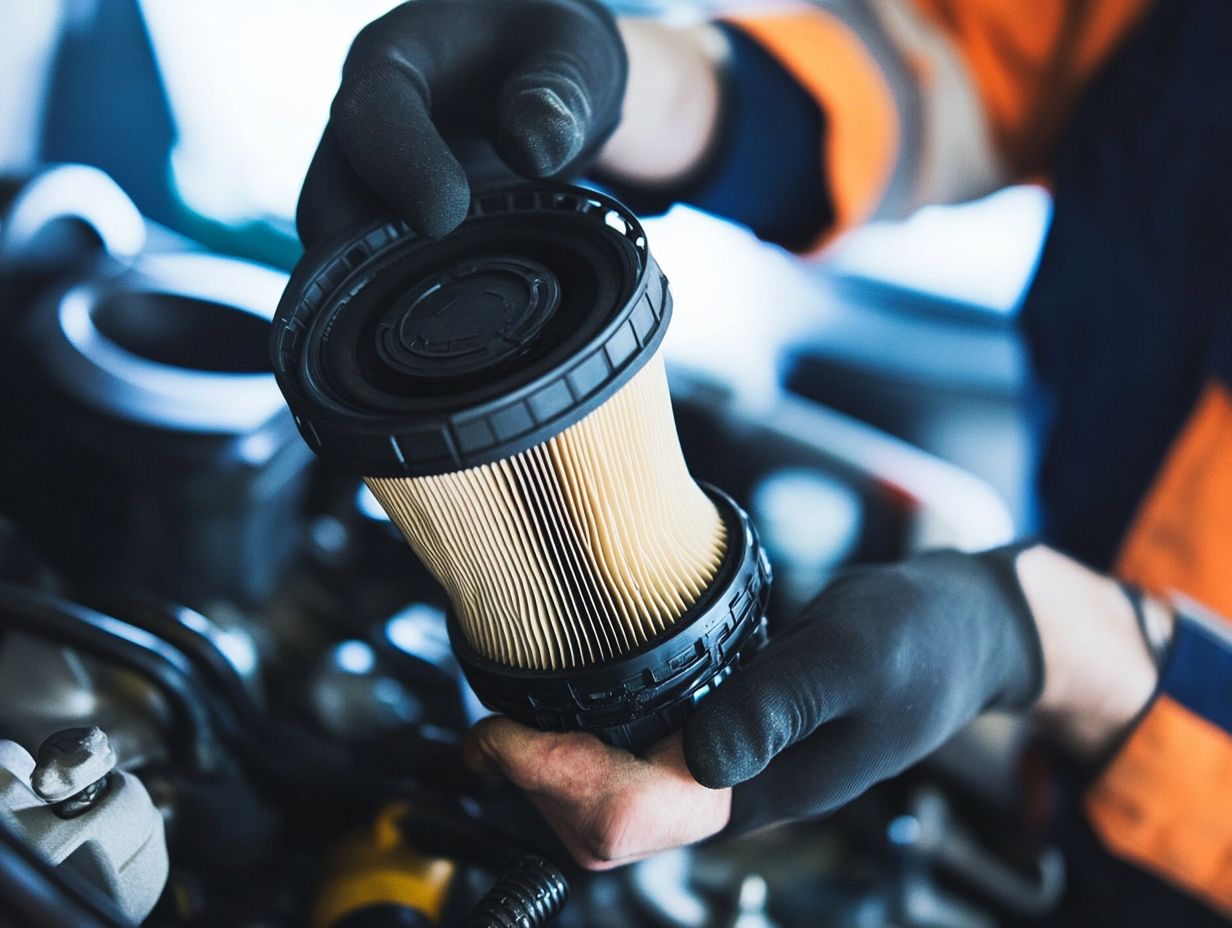
Maintaining your car’s fuel system can prevent damage to your engine and ensure your car runs efficiently. Learning how to maintain your car’s fuel system helps prolong the life of your vehicle and can save you money on expensive repairs.
How often should I get my fuel system checked?
It is recommended to get your fuel system checked at least once a year or every 10,000 miles, whichever comes first. However, if you notice any issues with your car’s performance, get it checked immediately.
What are some signs that my fuel system needs maintenance?
Some common signs include a decrease in fuel efficiency, difficulty starting your car, strange noises or vibrations while driving, and a check engine light appearing on your dashboard.
Can I maintain my car’s fuel system myself?
It is possible to perform some basic maintenance tasks such as replacing the fuel filter. However, it is recommended to have a professional mechanic inspect and clean your fuel system to ensure it is done correctly.
What does a fuel system maintenance service typically include?
A fuel system maintenance service usually includes inspecting and cleaning the fuel injectors, replacing the fuel filter, checking the fuel pressure and flow, and cleaning the throttle body and intake valves.
How can I prevent issues with my fuel system?
Keeping up with regular maintenance, using high-quality fuel, and avoiding over-filling your gas tank can help prevent issues with your fuel system. Additionally, understanding how to maintain your car’s suspension system is important to address any performance issues or warning signs promptly.


